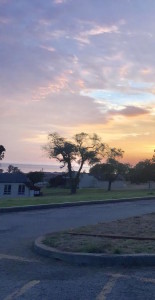
by Elana Rebitzer
What Happens in the Real World Stays There

While at summer camp, my campers aren’t allowed to have their phones on them. There are a multitude of reasons for our no-phone policy, but high among them is that we “disconnect to reconnect.” By removing internet access from our campers, we staffers create an immersive environment that can’t easily be affected by the happenings of the outside world. Even though staff members do have access to our phones, we have collectively agreed not to share with our children whatever information we learn.
If a counselor is having a bad day, that information ideally stays among the staff. This way, in the interest of allowing the campers to focus on having a fun and fulfilling summer, we create a world where news from the outside world, from celebrity engagements to mass shootings, does not penetrate.
But then the camp session ends. As the campers get onto the buses to return to their families, they check Instagram and Snapchat, and catch up on the world they’ve been so removed from. And as they go into the rest of the year, my 14- and 15-year-old campers are faced with the same ever-present realities of tragedy as the rest of us. I see them, posting on their Instagram stories with shock and horror as they learn and re-learn, at the same time I do, how scary it can be to live in America as a student, as a woman, as a Jew.
During the summer, it’s my responsibility to shield my campers from the messy inner workings of camp and the broader world. Now, removed from them, part of me wishes that I could do the same. I wish that I could give a simplified, two-sentence explanation of what’s happening in the world and why, like I can at camp when suddenly the schedule changes. I wish that I could sit with them as they’re upset and say that, because I’m 20 and I lived through high school, I know everything will be okay, like I can as they navigate friendships and crushes with each other.
But I can’t do that because, in the real world, I don’t have the answers. I don’t know why people want to kill Jews for being Jewish, why guns continually get into the hands of killers, why it seems like it’s not safe to be a woman in America. And I know that, as much as I wish otherwise, everything might not be okay. I wonder what anyone who feels responsible for others — parents, teachers, mentors — can do?
When I’m in shock, or grief, I turn to my own mentors: my own camp counselors, my high school teachers, the professionals at my Hillel who have been there for me more times than I can count. I have so many memories, ranging from my early childhood to just the past few weeks, of people sitting with me in the same way I try to sit with campers.
As I think back over these memories, a few stand out: hearing my 10th grade English teacher’s voice crack as she told us about the death of a student; sitting on the lawn with my camp counselor as she confessed to me that she, too, was homesick; listening to the rabbinic interns at Hillel discuss their own fears in light of the Supreme Court hearings just last month. Each of these instances sticks in my brain, some of them years later, because of the way that these mentors shared their own vulnerability with me. Their willingness to do so helped me realize that I wasn’t alone, and that these people whom I admired faced some of the same challenges as I did — and would push through them at my side.
Disconnecting to reconnect doesn’t work outside of camp. The real world is much bigger than my tiny camp community, and trying to hide the rest of the world from my campers, as appealing as it might sound, is an impossible and ultimately harmful wish.
I could try to pretend that I have any sort of answers to the questions they’re facing, but I have no idea what to say. So I have no choice but to allow myself to embrace vulnerability. I have to be honest, and tell my campers that I, too, am shocked. That I, too, worry for my own safety and the safety of my loved ones, and that, as they navigate the terrifying world outside of our camp bubble, I’ll be right there with them trying to figure it out myself.
Elana Rebitzer is an intern at Lilith and a student at Barnard College. During the summer, she works at Camp Ramah in Northern California.
The views and opinions expressed in this article are the author’s own and do not necessarily reflect those of Lilith Magazine.
